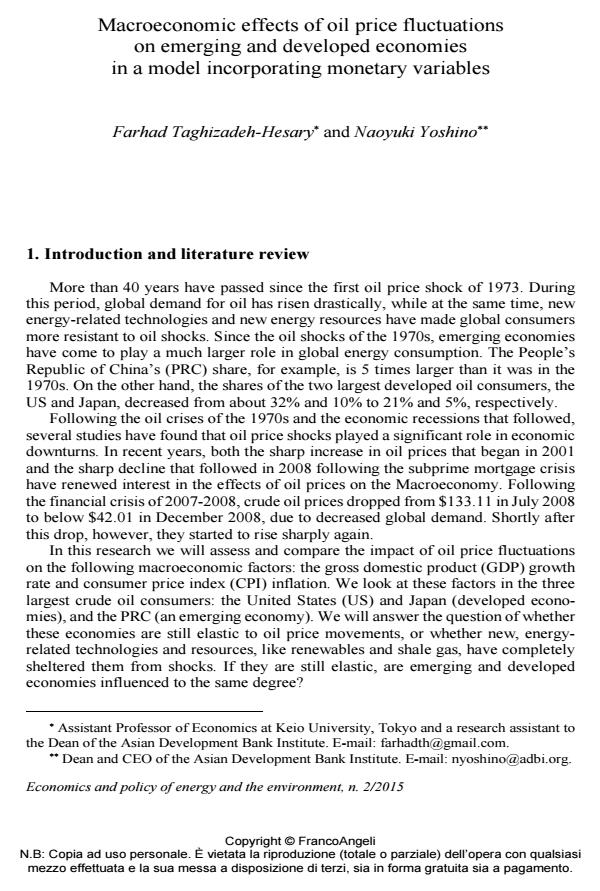Macroeconomic effects of oil price fluctuations on emerging and developed economies in a model incorporating monetary variables
Titolo Rivista ECONOMICS AND POLICY OF ENERGY AND THE ENVIRONMENT
Autori/Curatori Farhad Farhad Taghizadeh-Hesary
Anno di pubblicazione 2016 Fascicolo 2015/2
Lingua Italiano Numero pagine 25 P. 51-75 Dimensione file 323 KB
DOI 10.3280/EFE2015-002005
Il DOI è il codice a barre della proprietà intellettuale: per saperne di più
clicca qui
Qui sotto puoi vedere in anteprima la prima pagina di questo articolo.
Se questo articolo ti interessa, lo puoi acquistare (e scaricare in formato pdf) seguendo le facili indicazioni per acquistare il download credit. Acquista Download Credits per scaricare questo Articolo in formato PDF

FrancoAngeli è membro della Publishers International Linking Association, Inc (PILA), associazione indipendente e non profit per facilitare (attraverso i servizi tecnologici implementati da CrossRef.org) l’accesso degli studiosi ai contenuti digitali nelle pubblicazioni professionali e scientifiche.
The goal of this paper is to examine the impact of crude oil price movements on two macro variables, the gross domestic product (GDP) growth rate and the consumer price index (CPI) inflation rate, in three countries, the People’s Republic of China (an emerging economy), Japan, and the United States (developed economies), in a model incorporating monetary variables (money supply and exchange rate). The main objective of this research is to investigate whether these economies are still reactive to oil price movements and compare their reactions. Monetary variables are included in this survey because our earlier research showed that they have a significant role in oil price determination. To assess the relationship between crude oil prices and macro variables we adopt an N-variable structural vector autoregression (SVAR) model. The results suggest that the impact of oil price fluctuations on developed oil importers’ GDP growth is much milder than on the GDP growth of an emerging economy. On the other hand, however, the impact of oil price fluctuations on the People’s Republic of China’s inflation rate was found to be milder than in the two developed countries that were examined.
Parole chiave:Oil price, growth, inflation.
Jel codes:Q43, E31, O57
- Why Is Green Finance Important? Jeffrey D. Sachs, Wing Thye Woo, Naoyuki Yoshino, Farhad Taghizadeh-Hesary, in SSRN Electronic Journal /2019
DOI: 10.2139/ssrn.3327149 - Nexus between fiscal imbalances, green fiscal spending, and green economic growth: empirical findings from E-7 economies Ming Fang, Chiu-Lan Chang, in Economic Change and Restructuring /2022 pp.2423
DOI: 10.1007/s10644-022-09392-6 - Assessing the nexus mechanism between energy efficiency and green finance Dongyang Zhang, Ala Eldin Awawdeh, Muhammed Sajjad Hussain, Quang-Thanh Ngo, Vu Minh Hieu, in Energy Efficiency 85/2021
DOI: 10.1007/s12053-021-09987-4 - Does green finance improve energy efficiency? New evidence from developing and developed economies Mingzhe Yu, Qiang Zhou, Mui Yee Cheok, Jakub Kubiczek, Nadeem Iqbal, in Economic Change and Restructuring /2022 pp.485
DOI: 10.1007/s10644-021-09355-3 - Combining environmental taxation, spill-over effects and community-based financing in development of renewable energy projects in Asia Naoyuki Yoshino, Farhad Taghizadeh-Hesary, in ECONOMICS AND POLICY OF ENERGY AND THE ENVIRONMENT 1/2019 pp.133
DOI: 10.3280/EFE2018-001006 - Testing green fiscal policies for green investment, innovation and green productivity amid the COVID-19 era Linhao Zhao, YunQian Zhang, Muhammad Sadiq, Vu Minh Hieu, Thanh Quang Ngo, in Economic Change and Restructuring /2023 pp.2943
DOI: 10.1007/s10644-021-09367-z - Japan’s Lost Decade Naoyuki Yoshino, Farhad Taghizadeh-Hesary, Hiroaki Miyamoto, pp.147 (ISBN:978-981-10-5019-0)
- Decline in Oil Prices and the Negative Interest Rate Policy in Japan Naoyuki Yoshino, in SSRN Electronic Journal /2016
DOI: 10.2139/ssrn.2866767 - Empirical analysis of factors influencing the price of solar modules Farhad Taghizadeh-Hesary, Naoyuki Yoshino, Yugo Inagaki, in International Journal of Energy Sector Management /2019 pp.77
DOI: 10.1108/IJESM-05-2018-0005 - Oil price fluctuations and oil consuming sectors: An empirical analysis of Japan Farhad Taghizadeh-Hesary, Ehsan Rasoulinezhad, Yoshikazu Kobayashi, in ECONOMICS AND POLICY OF ENERGY AND THE ENVIRONMENT 2/2017 pp.33
DOI: 10.3280/EFE2016-002003 - Testing the impact of fiscal policies for economic recovery: does monetary policy act as catalytic tool for economic Survival Baihua Yuan, Wang Leiling, Hayot Berk Saydaliev, Vishal Dagar, Ángel Acevedo-Duque, in Economic Change and Restructuring /2022 pp.2215
DOI: 10.1007/s10644-022-09383-7 - Environmental Performance Assessment of Energy-Consuming Sectors Through Novel Data Envelopment Analysis Yangang Xue, Muhammad Mohsin, Farhad Taghizadeh-Hesary, Nadeem Iqbal, in Frontiers in Energy Research 713546/2022
DOI: 10.3389/fenrg.2021.713546 - Does supply chain matter for environmental firm performance: mediating role of financial development in China Wei Zhao, ZhengShan Luo, Qilei Liu, in Economic Change and Restructuring /2023 pp.3811
DOI: 10.1007/s10644-022-09410-7
Farhad Farhad Taghizadeh-Hesary, Macroeconomic effects of oil price fluctuations on emerging and developed economies in a model incorporating monetary variables in "ECONOMICS AND POLICY OF ENERGY AND THE ENVIRONMENT" 2/2015, pp 51-75, DOI: 10.3280/EFE2015-002005